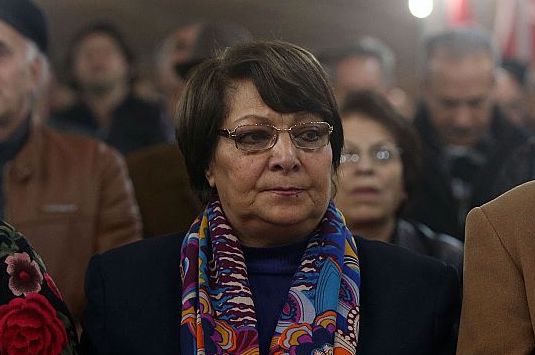San Fran State University Hosts Palestinian Terrorist; Zoom and YouTube Forced to Intervene

San Francisco State University’s Department of Arab and Muslim Ethnicities and Diasporas attempted to host a webinar on September 23rd with Palestinian terrorist Leila Khaled. Khaled, a member of the Popular Front for the Liberation of Palestine, which is classified as a terrorist organization in the United States, European Union, Canada, and Israel, participated in the hijacking of two planes in 1969 and 1970.
The webinar, titled “Whose Narratives? Gender, Justice, & Resistance: A Conversation with Leila Khaled,” was shut down by Zoom, citing “the speaker’s reported affiliation or membership in a US designated foreign terrorist organization” in a statement to The Lawfare Project.
Organizers responded in a statement posted on social media, stating that “Zoom has threatened to cancel this webinar and silence Palestinian narratives. We expect SFSU/CSU to uphold our freedom of speech and academic freedom by providing an alternative venue to this open classroom.”
Prior to the webinar, SFSU President Lynn Mahoney wrote an open letter defending the event, declaring that “a university can… allow its students and faculty the freedom to express contrary, even objectionable, views while also condemning anti-Semitism, Islamophobia, anti-Blackness, racism, and other hateful ideologies that marginalize people.” The letter continued by stating that “the University does not believe that the class panel discussion violates Zoom’s terms of service or the law.”
SFSU attempted to host the webinar on YouTube despite the intervention from Zoom and widespread protest; however, it was removed by YouTube after 23 minutes.
Prior to the event being shut down, organizers made statements acknowledging their “occupation” of Native American lands and made their introductions. In her introduction, SFSU Associate Professor Rabab Ibrahim Abdulhadi expressed her admiration for Khaled as a role model she had hoped to emulate as a child, according to The Times of Israel.
The webinar was cut off soon afterwards, when organizers showed a video clip of Khaled in which she said “our enemies call any form of popular resistance terrorism” and “as far as I’m concerned occupation is terrorism.”
In 1969, Khaled was one of two hijackers of TWA Flight 840 from Rome to Tel Aviv. The hijacked plane landed in Syria, where the Syrian Government released the hijackers without charges. Two Israeli passengers were taken hostage by the Syrian Government and were released months later in return for the release of Syrian and Egyptian prisoners in Israel.
In 1970, Khaled attempted to hijack El Al Flight 219 from Amsterdam to New York. The pilot of Flight 219 foiled the hijacking by putting the plane into a dive after Khaled pulled the pins in two hand grenades and threatened to blow up the plane. The resulting g-forces pushed Khaled and her accomplice to the ground. One of the sky marshals on board then shot and killed Khaled’s accomplice, but Khaled was subdued after being knocked unconscious during the free fall. The grenades on board failed to detonate.
In an interview with The Jewish News of California, the pilot of El Al Flight 219 stated that his actions were spurred by his knowledge of “what [the hijackers] would do to me and the crew and the Jewish passengers if we were taken.”
Antisemitic controversy is not new to SFSU. In 2019, SFSU reached a settlement in a lawsuit filed by two Jewish students, who alleged that SFSU and the Board of Trustees of CSU discriminated against them, according to a press release from The Lawfare Project. A similar lawsuit was dismissed in 2018.
This controversy comes during a time when anti-Semitism both nationally and on college campuses has been on the rise. According to the Anti-Defemation League’s yearly audit of antisemitic incidents, anti-Semitism is at a historic high with 2,107 anti-Semitic incidents recorded in the United States in 2019. Last year had the highest number of anti-Semitic incidents recorded in a single year, based on data available since 1979. Meanwhile, anti-Semitic incidents on college campuses remain high, with 186 incidents reported in 2019.